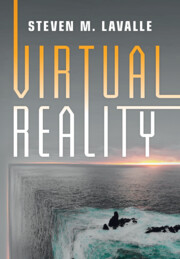Book contents
- Frontmatter
- Dedication
- Contents
- Preface
- Acknowledgments
- 1 Introduction
- 2 Bird’s–Eye View
- 3 The Geometry of Virtual Worlds
- 4 Light and Optics
- 5 The Physiology of Human Vision
- 6 Visual Perception
- 7 Visual Rendering
- 8 Motion in Real and Virtual Worlds
- 9 Tracking
- 10 Interaction
- 11 Audio
- 12 Evaluating VR Systems and Experiences
- 13 Frontiers
- References
- Image Credits
- Index
9 - Tracking
Published online by Cambridge University Press: 12 October 2023
- Frontmatter
- Dedication
- Contents
- Preface
- Acknowledgments
- 1 Introduction
- 2 Bird’s–Eye View
- 3 The Geometry of Virtual Worlds
- 4 Light and Optics
- 5 The Physiology of Human Vision
- 6 Visual Perception
- 7 Visual Rendering
- 8 Motion in Real and Virtual Worlds
- 9 Tracking
- 10 Interaction
- 11 Audio
- 12 Evaluating VR Systems and Experiences
- 13 Frontiers
- References
- Image Credits
- Index
Summary
We now want to model motions more accurately because the physics of both real and virtual worlds impact VR experiences. The accelerations and velocities of moving bodies impact simulations in the VWG and tracking methods used to capture user motions in the physical world. Section 8.1 introduces fundamental concepts from math and physics, including velocities, accelerations, and the movement of rigid bodies. Section 8.2 presents the physiology and perceptual issues from the human vestibular system, which senses velocities and accelerations. Section 8.3 then describes how motions are described and produced in a VWG. This includes numerical integration and collision detection. Section 8.4 focuses on vection, which is a source of VR sickness that arises due to sensory conflict between the visual and vestibular systems: the eyes may perceive motion while the vestibular system is not fooled. This can be considered as competition between the physics of the real and virtual worlds.
- Type
- Chapter
- Information
- Virtual Reality , pp. 211 - 244Publisher: Cambridge University PressPrint publication year: 2023

